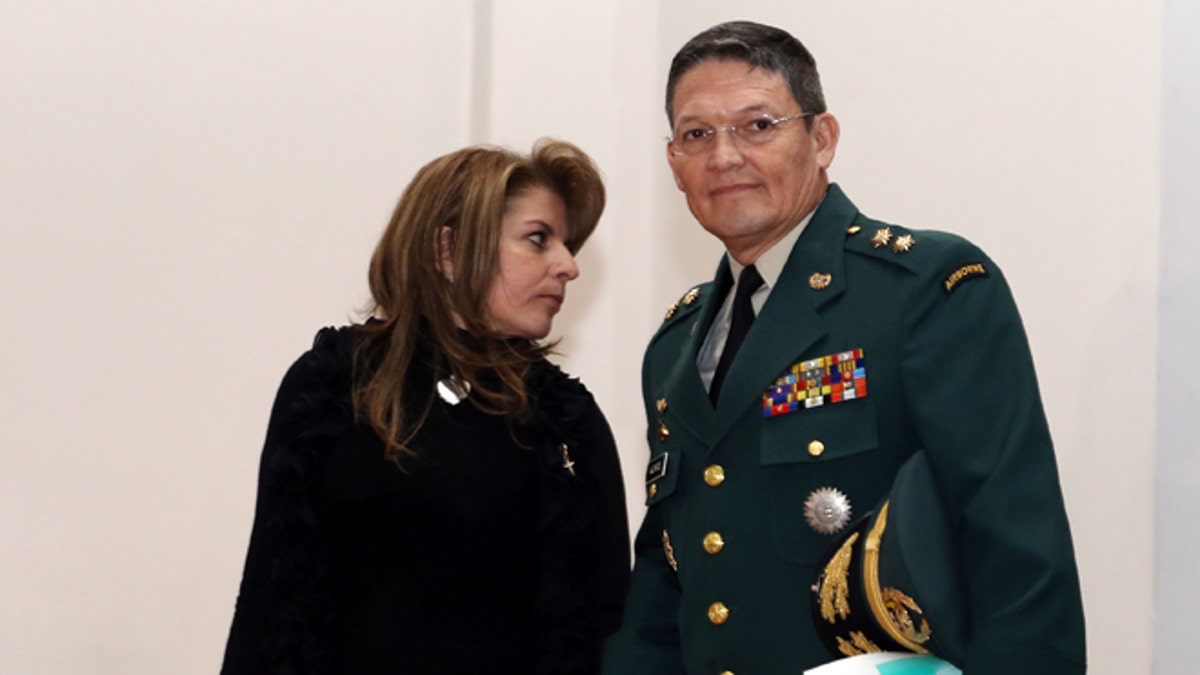
Army Gen. Ruben Alzate arrives with his wife, Claudia Farfan to read a statement for the press at the military hospital in Bogota, Monday, Dec. 1, 2014. Alzate, who was freed by rebels of the Revolutionary Armed Forces of Colombia on Sunday, two weeks after he and two companions were kidnapped by guerrillas, tendered his resignation and said he dishonored the uniform he's worn for 30 years by not following military protocol and venturing up a rebel-dominated river without a bodyguard and dressed as a civilian. (AP Photo/Fernando Vergara)
Bogotá, Colombia (AP) – An army general whose surprise capture by leftist rebels nearly derailed two years of peace talks has resigned after coming under pressure for venturing into guerrilla territory dressed as a civilian and without bodyguards.
Gen. Rubén Alzate, in his first remarks since being freed Sunday by the Revolutionary Armed Forces of Colombia, said he regretted that his decision not to follow military protocol had tarnished the institution he's served proudly for more than 33 years.
"Out of love and respect for our military institution, which has been affected by this incident, I've asked the national government to retire me from active service," Alzate, holding back tears and surrounded by his family, said Monday from a military hospital where he's recovering from his ordeal
Alzate is the highest-ranking officer ever seized by the FARC in 50 years of fighting and his capture two weeks ago forced President Juan Manuel Santos to immediately suspend talks taking place in Cuba.
Until Monday, little was known about the circumstances that led to Alzate's capture. The U.S.-trained counterinsurgent expert never alerted anyone, not even his family, where he was headed when he embarked on a river journey into one of Colombia most-dangerous conflict zones.
Alzate said he and his two companions — an army corporal and lawyer — were inspecting a rural power project when they were confronted by four armed men belonging to the FARC's 34th front. He said he had adopted a purposefully low profile in an effort to build trust among the war-weary population.
In captivity, he said he was handcuffed, tied to a tree at night and subjected to regular death threats while marching for long hours through the dense jungle — all in violation of international humanitarian law.
He also expressed resentment about being forced to endure what he called a "media show" by the rebels involving photos and videos of him half-embracing his captors, including a senior FARC commander, moments before his release. The images were released by the FARC to Venezuelan network Telesur.
Earlier Monday, Santos had demanded Alzate and the military explain themselves to the nation. He also dispatched to Havana his peace negotiators to evaluate ways to jumpstart talks.
While the capture of Alzate appears to have been accidental, the crisis it triggered exposed one of the peace process' biggest challenges: the lack of a bilateral ceasefire.
Santos, pushed by the military and conservative critics, has long rejected such an option for fear it would give the rebels use an opportunity to regroup after a decade of heavy battlefield losses. The FARC is pushing the president to show greater flexibility.
